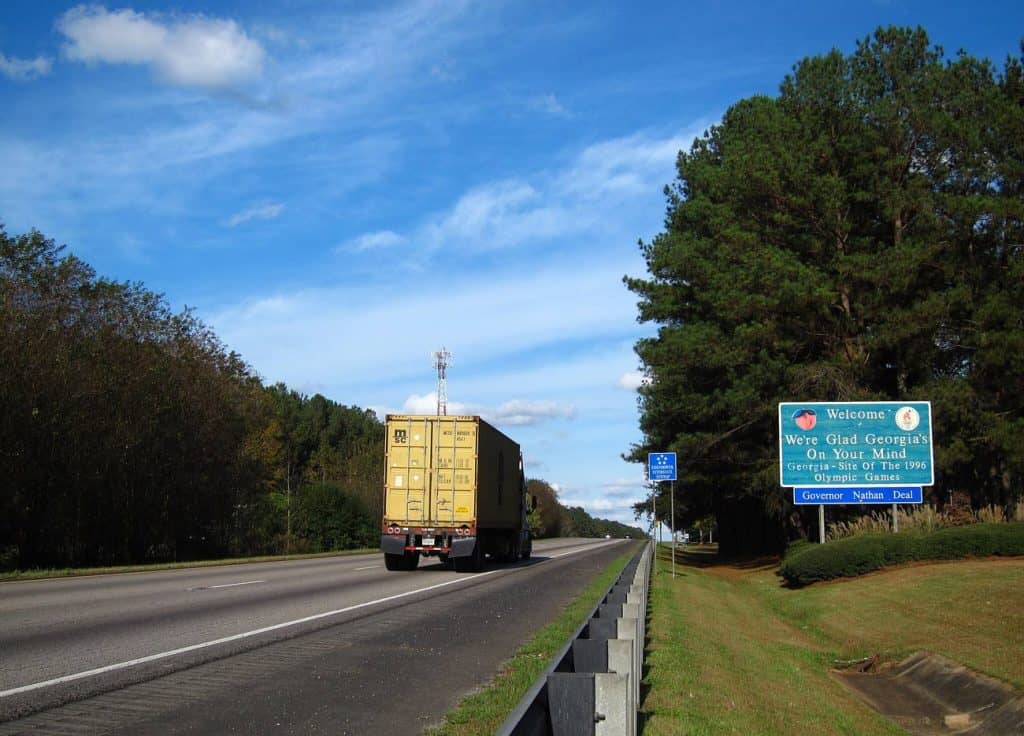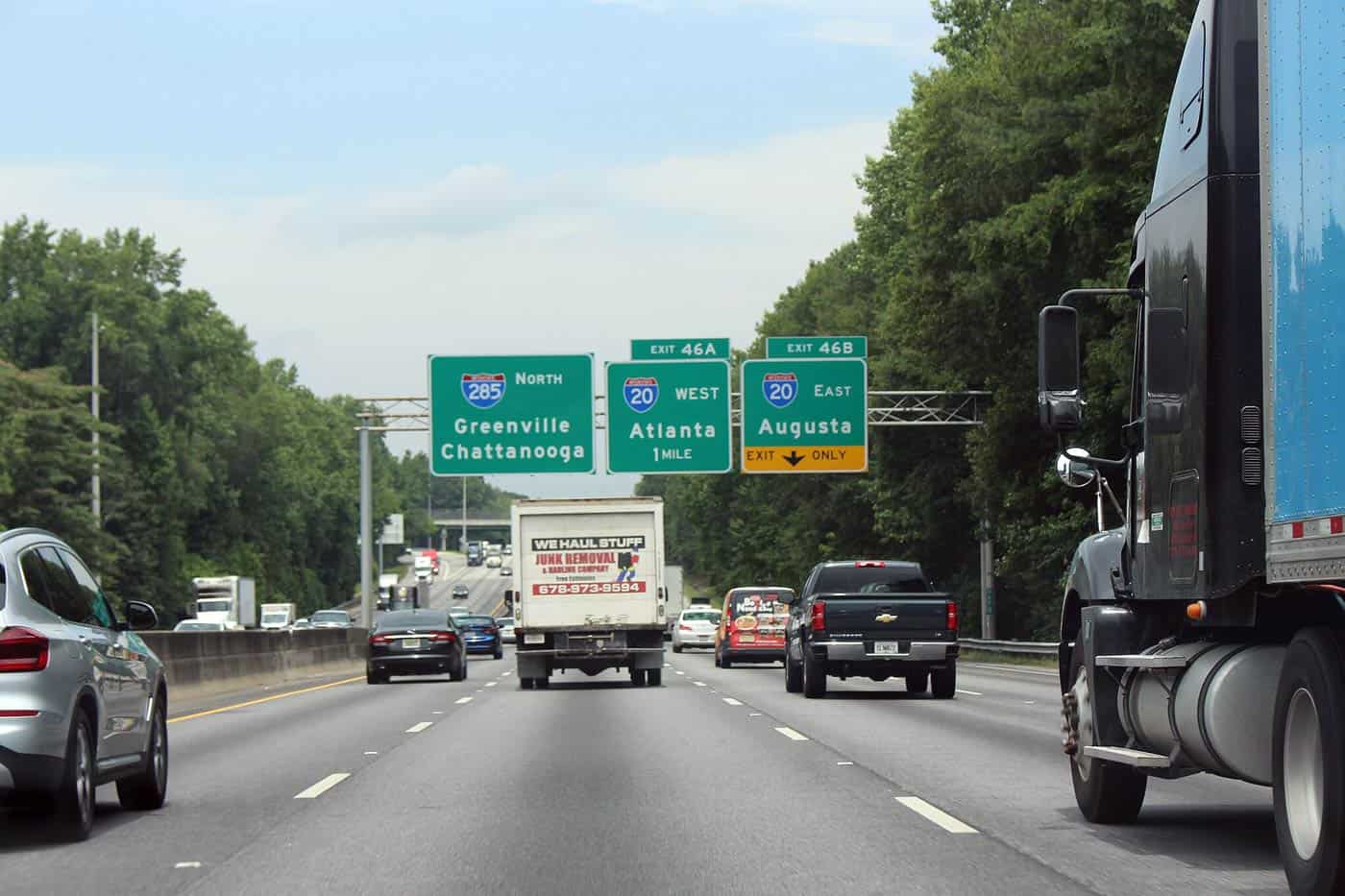Georgia Commercial Truck Insurance
If you are going to be operating a semi truck in Georgia, one of the basic legal requirements you will need to meet is purchasing commercial truck insurance.
In our Georgia commercial insurance guide, we will introduce you to the basic legal requirements, as well as the different types of semi truck insurance. We also will discuss the costs, and point you toward our recommended carriers.
Get Your Free Insurance Quote
Coverage Requirements For Trucking Insurance In Georgia
Let’s start out by going over how much insurance coverage you need to legally drive a commercial truck in GA.
Here are the FMCSA coverage requirements for Georgia Trucking Companies:
- All interstate carriers: $300,000 per accident of liability insurance
- All interstate carriers: $100,000 per person of liability insurance
- Interstate, hauling freight: $750,000 in liability coverage
- Hauling oil products: $1,000,000 in liability insurance
- Hauling hazardous materials: $5,000,000 in coverage
- Hauling household goods: $300,000 in coverage
- 12+ passengers onboard: $500,000 in coverage
These are just the minimums. You can purchase more insurance if you believe you need it. Note that as a Motor Carrier in the state you are also legally required to pay for workers’ compensation insurance if you have any employees.
Types of Semi Truck Insurance in GA

There are quite a few different types of semi truck insurance. Along with what we have discussed above, there are additional types of coverage that may be appropriate or necessary as well if you are involved in a truck accident.
- Primary liability coverage: You can cover repair costs and medical expenses if you get into an accident using primary liability coverage.
- General liability coverage: If you or one of your employees damages a third party or their property, general liability coverage can help pay for legal expenses or medical costs.
- Motor truck cargo insurance: Cover the freight you are transporting with this type of insurance policy.
- Trailer interchange insurance: If you ever rent trailers for your trucking business, you can protect the trailers with this type of insurance coverage. If a rented trailer is damaged, then the policy can help pay for it.
- Bobtail liability: If you get into an accident in your truck, but you do not have a trailer attached at the time that it occurs, bobtail liability coverage can pay out. If you do not have this type of coverage, not that other policies will not cover you.
- Non-trucking liability insurance: Should an accident occur while you are driving the truck for purposes outside of work, this coverage can kick in. Note that your commercial vehicle is not protected by your personal auto policy during times like this.
- Physical damage insurance: If your vehicle gets into an accident or is vandalized, you can rely on physical damage coverage. You also can use this type of coverage if fire or weather damages your truck.
- Uninsured motorist coverage: What if you get into an accident, and the other party does not have adequate insurance to pay for the damages for which they are responsible? In this situation, your uninsured motorist policy provides coverage.
- Umbrella policy: If you need to close policy gaps or raise maximums, you can get trucking umbrella coverage.
- Worker’s compensation: This type of coverage is required by law if you have employees. You need to purchase coverage for medical treatments and lost wages in case any of them become sick or injured while working.
- Occupational accident: What happens if you are the one who becomes sick or injured while working? As an owner-operator, you can cover yourself with this type of insurance in a similar fashion to workers’ comp.
How Much Does Commercial Truck Insurance in Georgia Cost?
The cost for Georgia commercial truck insurance can vary depending on a range of factors. On average, Georgia’s truckers’ insurance costs range from anywhere from $8,500 to $14,000 a year. That is for a single truck.
Here are some of the factors that can result in higher or lower costs for Georgia commercial insurance.
- The types of coverage you select: The more types of insurance coverage you buy for your business, the more your total costs will add up.
- The maximum coverage: The higher the maximum coverage amounts, the more expensive the monthly premiums will be for your commercial truck insurance.
- The deductible: The lower the deductible amounts, the pricier the monthly premiums will be for your commercial truck insurance. You will need to decide whether it is worth it to you or not to raise your deductible or lower your max coverage to reduce your monthly costs.
- The type of truck you drive: There are a number of different types of trucks you can drive for commercial purposes. Each has a different risk profile from an underwriting standpoint. So, some types of commercial trucks cost more than others to insure, all other factors being equal.
- What kind of freight you haul: There are certain types of cargo that are more expensive to insure. These include freight such as oil, livestock, refrigerated goods, etc. There are things that can go wrong with these sorts of freight beyond what can go wrong for a lot of other types of goods. Refrigerated freight can spoil, livestock can be injured or escape, oil can spill, etc.
- The size of your fleet: The more commercial trucks you need to insure, the more you will pay for insurance every month.
- Your experience: If you have extensive experience in this business, you might receive more competitive quotes than if you were brand new to the industry.
- Your driving record: A clean driving record shows that you are a safe and reliable driver, which may result in more competitive insurance rates.
- Past claims: By avoiding filing claims, you can potentially qualify for discounted rates on Georgia truck insurance.
- Bundling and other discounts: Along with discounts for a clean claims history, you might encounter other types of discounts as well, such as discounts for bundling multiple types of policies at one carrier.
- Underwriting: Every insurance carrier has its own individual underwriting guidelines. So, you will receive different commercial truck insurance quotes from different carriers in GA, even if all the other factors are the same when you apply.
Georgia Truckers: Get Free Semi Truck Insurance Quotes
If you are ready to get the semi truck insurance you need to operate, click on any of the links below to visit our recommended Georgia truck insurance companies. After comparing a few personalized quotes, you will be able to get an excellent deal on the coverage you need to legally and safely haul freight in the Peachtree state.


